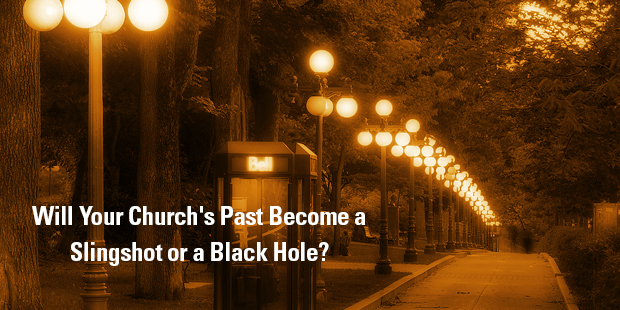
Will Your Church’s Past Become a Slingshot or a Black Hole?
Times were better. Our country was more united. Our churches were growing. We felt better about our present and future.
The pull of the past is powerful. Politicians know it, and so they pick a point in time—a pinnacle from which we’ve fallen, and then frame our current debates around the way to return to a golden era. Those on the right think of the 1950s or 1980s, while those on the left pine for the 1960s. (See Yuval Levin’s work on this subject.)
Churches know the pull of the past as well. A church that went through an era of peace and growth, that faced the challenges of the day and won converts and enjoyed status in the community, can succumb to a widespread malaise once the tide goes out. If we could just go back, say some of the elderly in the church, mourning the loss of a particular church culture.
The pull of the past is a good yet dangerous thing. Its force can either serve as a slingshot, whereby we pull back into the past in order to gain the force necessary to be propelled forward on our mission. Or its force can serve as a black hole that sucks up all our energy and emotion, until our present and future are swallowed up in a void of hopelessness.
How can we tell the difference?
Nostalgia as Black Hole
Let’s look at the negative side of the past’s pull—the descent into nostalgia that supplants mission. There is wisdom in looking to the past in order to find the resources we need in the present, but we are wrong to see history as prescribing a particular path forward.
The idea that we can implement the same measures and methods as previous generations, in spite of how our cultural moment has changed, is to give in to the black hole of nostalgia. It is the choice between living in the past and learning from it. We demand from our ancestors a map for the way forward instead of seeing the past as a treasure chest from which we pull out the resources we need.
As Kyle David Bennett writes:
“Nostalgia hijacks memory. It is the desire to return to an old present . . .
“In nostalgia, one sacrifices the present and the possibility of the future as one squats in the past. Nostalgia implies that God is present in one moment and not another, or more perniciously, that one prefers to be in a previous, unlivable moment more than the one God has brought them to now.”
Longing for the Past and Fearful of the Future
It is one thing to long for and regret the loss of goods we observe in a past era—goods that have been eclipsed or overshadowed by cultural change. R. R. Reno says that the good kind of nostalgia “expands our moral horizons, reminding us that our present form of life lacks something important.”
But the desire to inhabit a different era is idolatrous—a subtle yet undeniable attempt to doubt the wisdom of God, the Creator who gave us life in this particular time and place. We cannot be fully on mission in this era as long as we are longing for another.
Memory can be a sturdy foundation for the future, or memory can suffocate our mission.
Lesslie Newbigin, the famed missionary theologian, warned that “nostalgia for the past and fear for the future are equally out of place for the Christian.” Nostalgia and fear distract us from the question we must be asking:
“What is God doing in these tremendous events of our time? How are we to understand them and interpret them to others, so that we and they may play our part in them as co-workers with God? [The Christian] is required, in the situation in which God places him, to understand the signs of the times in the light of the reality of God’s present and coming kingdom, and to give his witness faithfully about the purpose of God for all men.”
Incarnational Remembering
If orthodox Christians tend to live in the past, revisionists and schismatics wish to jettison the past altogether, crowning our contemporary generation with a depth of moral insight unknown to any of our ancestors. We are right to see a role for the past, but how do we do this?
How can we resist the temptation of despair or nostalgia?
I like the distinction Kyle David Bennett makes between nostalgia and “incarnational remembering.” Here is how he puts it:
“Our participation in the renewal of all things requires remembering the past. When we remember the past, we let the past portrayal of the future inform our present. In other words, when we look to the past, we re-view the present and our world in light of the future. This affects our perception of and action in the present . . .
“Christians are called to remember the past, not to live in it. A follower of Jesus is not nostalgic. We do not turn to the past to reencounter or remedy a personal wound like some do in nostalgia. Rather, we turn to the past in order to reencounter healing and reconciliation with the goal of remedying the wounds of others here and now. Incarnational remembrance is sacrificial, not selfish. It minds the past to draw on it; it does not fill the mind with the past in order to reenact or relive it. Incarnational remembrance renews, it doesn’t relive.”
What are some ways that we can draw on the past to renew our churches in the present? How can we ensure that the past does not squelch but serve our mission in the present? These are the questions we must wrestle with if we are to keep nostalgia from overwhelming our hope.

Tags: Past, Trevin Wax, fearful for the future, longing for the past, protecting the past












